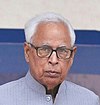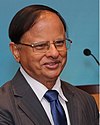Principal Secretary to the Prime Minister of India
| Principal Secretary to the Prime Minister of India | |
|---|---|
| Bhārat Ke Pradhānmantrī Ke Pradhān Saciv | |
 | |
 | |
since 11 September 2019 | |
| Prime Minister's Office | |
| Abbreviation | PS to PM |
| Reports to | Prime Minister of India |
| Seat | Prime Minister's Office, South Block, Secretariat Building New Delhi |
| Appointer | Appointments Committee of the Cabinet |
| Inaugural holder | P. N. Haksar |
| Formation | 6 December 1971 |
The Principal Secretary to the Prime Minister of India (PS to the PM; ISO: Bhārat Ke Pradhānmantrī Ke Pradhān Saciv) is the administrative head of the Prime Minister's Office. The officeholder is generally a civil servant, commonly from the Indian Administrative Service and occasionally from the Indian Foreign Service.
Since 2019, the officeholder has been accorded with the status of a cabinet minister.[1] The office holder ranks 7th in the Order of Precedence of India.
History
[edit]The Prime Minister's Secretariat (PMS)—headed by an officer of the rank of joint secretary to the Government of India—was established after independence under the prime ministership of Jawaharlal Nehru, as a successor to the office of the Governor-General of India's secretary.[7] Lal Bahadur Shastri appointed Lakshmi Kant Jha, an Indian Civil Service officer, as his secretary, making Jha the first secretary to the Government of India-ranked officer in the PMS.[9] During Indira Gandhi's tenure as prime minister, the post of Principal Secretary to the Prime Minister was created;[2][4][8] with retired Indian Foreign Service officer P. N. Haksar becoming the first PS to the PM.[11]
Role
[edit]The Principal Secretary to the Prime Minister of India acts as the administrative chief of the Prime Minister's Office.[6][12][13][14] The main functions of the officeholder often include, but are not limited to:
- Advising the prime minister on domestic and foreign policy matters.[12]
- Overseeing the affairs of ministries and departments assigned by the prime minister.[12]
- Coordinating activities in the Prime Minister's Office.[12]
- Dealing with official, governmental, important paperwork in the Prime Minister's Office.[12]
- Preparing notes on issues to be discussed by the prime minister with senior politicians, bureaucrats, and other dignitaries.[12]
- Placing before the prime minister critical files of importance for approval and instructions.[12]
The Principal Secretary to the Prime Minister is generally considered the latter's most crucial aide.[14][15][16][17]
Office holders
[edit]List of office holders of the Principal Secretary to the Prime Minister.[10]
| No. | Portrait | Principal Secretary to the Prime Minister of India | Took office | Left office | Time in office | Service | Prime Minister of India |
|---|---|---|---|---|---|---|---|
| 1 | P. N. Haksar (1913–1998) | 6 December 1971 | 28 February 1973 | 1 year, 84 days | Indian Foreign Service | Indira Gandhi (INC) | |
| 2 | V. Shankar | 4 April 1977 | 31 July 1979 | 2 years, 118 days | Indian Civil Service | Morarji Desai (JP) | |
| 3 | P. C. Alexander (1921–2011) | 2 May 1981 | 18 January 1985 | 3 years, 261 days | Indian Administrative Service | Indira Gandhi (INC) (2 May 1981 – 31 October 1984) Rajiv Gandhi (INC) (31 October 1984 – 18 January 1985) | |
| 4 | B. G. Deshmukh (1929–2011) | 27 March 1989 | 11 December 1990 | 1 year, 259 days | Indian Administrative Service | Rajiv Gandhi (INC) (27 March 1989 – 2 December 1989) V. P. Singh (JD) (2 December 1989 – 10 November 1990) Chandra Shekhar (SJP(R)) (10 November 1990 – 11 December 1990) | |
| 5 | S. K. Misra (born 1932) | 11 December 1990 | 24 June 1991 | 195 days | Indian Administrative Service | Chandra Shekhar (SJP(R)) | |
| 6 | Amar Nath Verma | 25 June 1991 | 15 May 1996 | 4 years, 324 days | Indian Administrative Service | Narasimha Rao (INC) | |
| 7 | T. R. Satishchandran (1929–2009) | 12 June 1996 | 30 June 1997 | 1 year, 18 days | Indian Administrative Service | H. D. Deve Gowda (JD) (12 June 1996 – 21 April 1997) Inder Kumar Gujral (JD) | |
| 8 | Narinder Nath Vohra (born 1936) | 1 July 1997 | 19 March 1998 | 261 days | Indian Administrative Service | Inder Kumar Gujral (JD) | |
| 9 | Brajesh Mishra[a] (1928–2012) | 19 March 1998 | 22 May 2004 | 6 years, 64 days | Indian Foreign Service | Atal Bihari Vajpayee (BJP) | |
| 10 | T. K. A. Nair (born 1939) | 28 May 2004 | 3 October 2011 | 7 years, 128 days | Indian Administrative Service | Manmohan Singh (INC) | |
| 11 | Pulok Chatterji (born 1948) | 3 October 2011 | 26 May 2014 | 2 years, 235 days | Indian Administrative Service | Manmohan Singh (INC) | |
| 12 | Nripendra Misra (born 1945) | 28 May 2014 | 10 September 2019 | 5 years, 105 days | Indian Administrative Service | Narendra Modi (BJP) | |
| 13 | Pramod Kumar Mishra (born 1948) | 11 September 2019 | Incumbent | 5 years, 134 days | Indian Administrative Service | Narendra Modi (BJP) |
Additional principal secretary
[edit]A prime minister—through the Appointments Committee of the Cabinet—can also appoint an additional principal secretary. The only instance of an additional principal secretary being appointed was in May 2014, Pramod Kumar Misra, a retired 1972-batch Gujarat cadre Indian Administrative Service (IAS) officer, was appointed by the Appointments Committee of the Cabinet to serve as newly elected Prime Minister Narendra Modi's additional principal secretary.[18][19]
Notes
[edit]- ^ Concurrently served as the first National Security Advisor from November 1998 to May 2004 (5 years, 6 months).
References
[edit]- ^ "Government gives cabinet rank, extension to Nripendra Misra and PK Mishra". The Economic Times. 11 June 2019. Retrieved 21 June 2020.
- ^ a b c Mehta, Dalpat Singh (1968). Handbook of Public Relations in India. New Delhi: Allied Publishers. p. 135. ISBN 978-8170233343.
- ^ Singh, Karuna (July–September 2007). "Prime Minister's Office : A Critical Analysis". The Indian Journal of Political Science. 68 (3): 629–640. ISSN 0019-5510. JSTOR 41856360.
- ^ a b c d Singh, N. K. (31 May 2015). "The PMO Under Modi Takes Unprecedented Shape". NDTV. Retrieved 6 September 2018.
- ^ a b Mehra, Ajay K. (28 March 2001). "Abolish the PMO". The Hindu. N. Ram. ISSN 0971-751X. OCLC 13119119. Retrieved 6 September 2018.[dead link]
- ^ a b c d Mookerji, Nivedita (10 October 2017). "The most powerful PMO in India's history". Business Standard. Business Standard Ltd. OCLC 496280002. Retrieved 6 September 2018 – via Rediff.com.
- ^ [2][3][4][5][6]
- ^ a b c Satishchandran, T. R. (1 April 2001). "PMO Calling". The Tribune. Retrieved 5 August 2018.
- ^ [4][5][6][8]
- ^ a b "List of Principal Secretaries to PM along with their Tenures" (PDF). Prime Minister's Office, Government of India. Retrieved 9 August 2018.
- ^ [2][4][6][8][10]
- ^ a b c d e f g Laxmikanth, M. (2014). Governance in India (2nd ed.). Noida: McGraw-Hill Education (published 25 August 2014). pp. 3.17 – 3.19. ISBN 978-9339204785.
- ^ Unnithan, Sandeep (19 April 2018). "Official Top 10: Hidden power". India Today. Aroon Purie. ISSN 0254-8399. Retrieved 7 August 2018.
- ^ a b Ramesh, PR; NP, Ullekh (22 May 2015). "Prime movers for Narendra Modi". Open. Ashok Bindra. Retrieved 6 August 2018.
- ^ Bhattacharya, A. K. (15 April 2014). "A K Bhattacharya: The PMO and the PM". Business Standard. New Delhi: Business Standard Ltd. OCLC 496280002. Retrieved 5 August 2018.
- ^ "A Principal Decline in South Block". Business Standard. BSCAL. Business Standard Ltd. 13 April 1998. OCLC 496280002. Retrieved 5 August 2018.
{{cite news}}: CS1 maint: others (link) - ^ Agha, Zafar (15 September 1992). "As Narasimha Rao consolidates hold on Congress(I), his style becomes more autocratic". India Today. Aroon Purie. ISSN 0254-8399. Retrieved 5 August 2018.
- ^ "Ex-agriculture secy P K Mishra is Modi's Addl Principal Secy". The Indian Express. New Delhi: Indian Express Group. Express News Service. 10 June 2014. OCLC 70274541. Retrieved 6 August 2018.
- ^ "P.K. Mishra is Additional Principal Secretary to PM". The Hindu. New Delhi: N. Ram. Press Trust of India. 11 June 2018. ISSN 0971-751X. OCLC 13119119. Retrieved 6 August 2018.
Bibliography
[edit]Books
[edit]- Mehta, Dalpat Singh (1968). Handbook of Public Relations in India. New Delhi: Allied Publishers. ISBN 978-8170233343.
- Laxmikanth, M. (2014). Governance in India (2nd ed.). Noida: McGraw-Hill Education (published 25 August 2014). ISBN 978-9339204785.




![Brajesh Mishra[a]](http://upload.wikimedia.org/wikipedia/commons/thumb/e/e6/Brajesh_Mishra.jpg/100px-Brajesh_Mishra.jpg)

